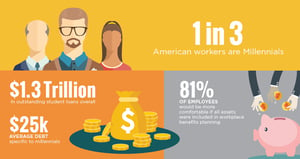Much has been written about how to attract and retain millennial workers in today’s economy, and for good reason.
U.S. Census Bureau data shows that more than one in three American workers are millennials. In 2015, millennials surpassed Generation X as the largest represented generational group in the American workforce. Savvy businesses understand the importance of appealing to this vibrant and rapidly growing workforce, but it isn’t always easy. Understanding how millennials think and what they want are the keys to attracting this critical demographic. Here are a couple of insights on how to do so:
Help them conquer the $25,000 monster
Financial concerns outside the workplace can have a significant impact on employee productivity in the workplace. Smart organizations recognize that when they support their employees’ lives off the clock, they get the best out of employees on the clock.
While free meals, a “bring your pet to work” policy or happy hours are nice perks, millennials are looking for competitive benefits when job seeking. And they’re trying to find new ways to manage a very real financial concern facing millions of Americans: student debt.
Americans collectively owe more than $1.3 trillion in outstanding student loans and that figure is growing at a rate of nearly $3,000 per second. Millennials specifically are saddled with $25,000 of student debt on average. According to a recent study, even millennials earning large starting paychecks are carrying so much student loan debt that they’re concerned they won’t be able to pay their debts in full. Yet few organizations are using repayment programs to recruit young workers.
Typically, employer loan repayment assistance programs (LRAPs) provide employees with money to put directly towards their student loan payments. This frees up earnings so workers can pay for other necessities, like food and rent. This type of benefit is more than a perk. It gives companies a competitive edge in recruitment, particularly with millennials who will likely earn an entry- or mid-level salary and find it challenging to balance student loan payments with the everyday costs of living.
Provide a comprehensive, one stop shop
From physical to financial health, employees – particularly millennials – want their benefits to support all facets of their life and want to manage these benefits in one place. In fact, 81 percent of employees would feel more comfortable if all of their personal assets were included in workplace-related benefits planning.
Many businesses are hesitant to jump into this type of benefits administration because it can seem daunting from an implementation standpoint. Administrators need a solution that supports them – and their employees – in choosing and managing these benefits.
At Businessolver, we’ve seen firsthand how employers and employees increasingly need more than just a benefits platform that facilitates sign-up. They need recommendation engines with a one-wallet approach that manage benefits in a holistic manner – the way employees do.
Businessolver’s MyChoice recommendation engine, for example, was developed knowing that employees only have one-wallet to spend from. It considers an employee’s financial, physical and emotional status when helping users select benefits.
For an increasingly debt saddled workforce, a one-wallet approach to benefits isn’t a nice-to-have, but rather an imperative. It’s a very real draw for potential millennial employers, and can help businesses make other attractive offerings a reality. For example, by using a partner and platform that take a holistic view of benefits, the process of developing and providing a student loan debt repayment offering can be more easily facilitated.
To truly harness the power of the millennial workforce, business leaders have to evolve their benefits offerings and choose the right partners who can help facilitate this evolution. Businesses who don’t adapt to the changing wants and needs of the millennial dominated workforce could find themselves lagging behind in recruitment, retention and overall employee morale. Click here to learn more about our one-wallet approach and how it can be applied to improve your benefits offerings.



.png)